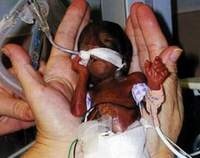World's smallest baby to stay at hospital longer for precaution
A girl born after just under 22 weeks in the womb - among the shortest gestation periods known for a live birth - will remain in a hospital a few extra days as a precaution, officials said.

Amillia Sonja Taylor was just 9Ѕ inches (24 centimeters) long and weighed less than 10 ounces (283 grams) - less than a can of soda - when she was delivered Oct. 24 after just under 22 weeks in the womb.
Click here to see photos of the smallest baby in the world
She had been expected to be sent home from Baptist Children's Hospital on Tuesday.
However, routine tests indicated she was vulnerable to infection, said Dr. Paul Fassbach, who has cared for the baby since shortly after she was born.
"She has been fine," Fassbach said Tuesday, but doctors are being extra cautious "now that she's going into the world."
Doctors say Amillia is among the few babies known to have survived after a gestation of fewer than 22 weeks. She was delivered by Caesarean section. Full-term births come after 37 to 40 weeks, the AP says.
Amillia, the first child for Eddie and Sonja Taylor of Homestead, now weighs 4Ѕ pounds (2.04 kilograms) and is just over 15Ѕ inches (39.37 centimeters) long.
She has suffered respiratory and digestive problems, as well as a mild brain hemorrhage, but doctors believe the health concerns will not have major long-term effects.
Amillia was conceived in vitro and has been in an incubator since birth. She will continue to receive a small amount of supplemental oxygen even after she goes home.
She was delivered because her mother was suffering from complications. Fassbach said that if doctors had known Amillia's real gestational age, they might not have intervened. He said he thought she was at least 23 weeks, and doctors were shocked when the Taylors' fertility specialist pinpointed the exact date of fertilization.
Fassbach cautioned against rushing to redefine the medical standards for fetus viability, the AP reports.
"We just don't know which 21- to 22-weekers are going to do well and which are not going to do well," he said. "I don't think we should change what we do, but it shows us we need to do more research and find out where our edge of viability is going to go."
Preterm births occur in about 12 percent of all pregnancies in the U.S., according to the National Institutes of Health.
AP photo
Subscribe to Pravda.Ru Telegram channel, Facebook, RSS!





